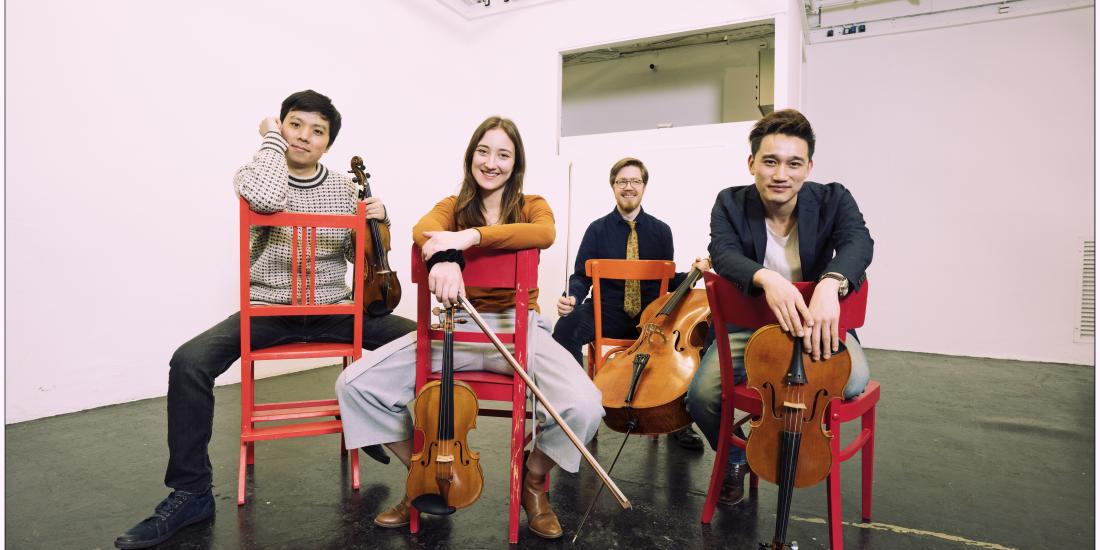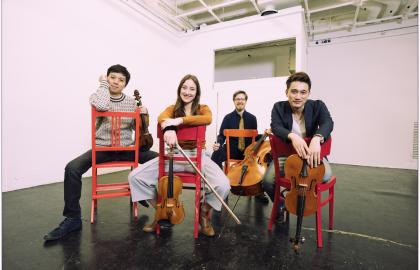How does it feel to be a Rising Star?
It feels very nice to receive a lot of appreciation and support by the ECHO Organisation as well as the involved concert halls. It is a fantastic opportunity to perform at these big, important venues and to connect with culturally different audiences all over Europe. It is of course also very exciting, because it´s a huge step in our career to be able to present ourselves in these halls. The experience and training we gain within every concert is crucial for our further career, and we have already learned a lot.
String quartets get often the label difficult. How would you recommend for a wider audience to come and listen anyway?
The string quartet genre, when compared to other genres e.g. song recitals (Liederabende) or the opera where you have an underlying text supporting a narrative, has little obvious programmatical elements. But nonetheless, the string quartet is a genre full of musical conversation and discourse, both between the instruments and the movements of the pieces themselves. If one listens closely, the narrative carried out by the instruments themselves will reveal itself in many different ways; in some pieces mainly by the first violin, in some pieces in a more dialogical or conversational form between the four of us. In this case it sometimes can seem like four soloists are contributing to the story. The genre offers both a very personal and intimate musical experience as well as homogenous parts, similar to orchestral or choir pieces. We would say that it is not necessarily a difficult genre to listen to because it offers a big variety of harmonical colors, homogenous passages, and dialogues between the instruments.
Beethoven, Webern and a contemporary composer. Do you always look for connections between old and new?
It is never our primary intention to programmatically link the pieces, but we like to play music from different styles, and we do find that our understanding of music gets enriched this way. Of course there is a strong historical connection between Haydn and the first Viennese school, Beethoven and the works of romantisicm, Webern and even beyond. So in the beginning of our studies we focused on deepening our understanding for the works of the first Viennese school a lot, in order to understand the music composed after that. We often explored in our rehearsals, how pieces of different composers differed. This could e.g. be the way in which they dealt with structure and form, characters as well as the use of voice and harmonical colours and how they use instrumentation. But we do not choose our programs concentrating on the connection between old and new, rather the link of the individual meaning and effects of the pieces themselves.
Another fascinating experience we made while working on contemporary music was, when going back to some of the earlier genres, our ears would suddenly listen in a different way. That is always very inspiring.
Do you have a guilty pleasure?
We didn’t find this question too easy to answer, and we think the four of us have different guilty pleasures. Here are some ideas:
- Just do nothing.
- Travel (for leisure), so one doesn’t have to think about stuff.
- When travelling with public transport, having to look when the person next to oneself is opening his/her smartphone and reading whatever appears on the screen.
- In the concert, one of us would tune 3,5% higher than the others.
- In the rehearsal, some of us would mimic some of our musical heroes, and sometime caricature them.
What is your biggest dream?
- Simple life – easy life: less panic, freedom to choose what to eat and where to live, less stress, less worries.
- To play concerts and record the complete Beethoven string quartets.
- One day to have children and to combine this with the life of a string quartet.
- To have a good string quartet and be able to share music with lovely audiences.


